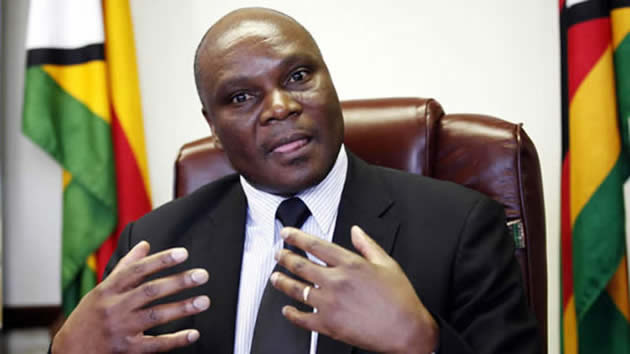Industry must be revived

Victoria Ruzvidzo : Business Focus
Mines and Mining Development Minister Walter Chidhakwa was spot on last week when he proposed that the mining sector, and other sectors at large, could revive production levels in the manufacturing sector while increasing the country’s Gross Domestic Product if some if they bought the bulk of their machinery an consumables locally.I thought this was a prescription that could easily deal with the major ailments afflicting the economy presently, particularly low production levels and liquidity constraints.
Of course the question that quickly comes to mind is that the local manufacturing sector does not have the technology, machinery and capital to produce the consumables and machinery for the mining sector and other sectors of the economy. Indeed this is quite logical but at the same time the manufacturing sector can be capacitated in the short to medium term so it can produce the demands for other sectors of the economy.
And yes, that is very possible even in this environment. A few years ago there were productive sector facilities through which funds were amassed via the central bank and other local and external lenders and they achieved much, in instances where the funds were used for the purposes for which they were borrowed.
A similar package could be launched targeted at specific and strategic firms in the manufacturing sector and even other sectors such as agriculture with strict monitoring and evaluation to ensure results.
“Can you imagine what would happen to this economy if every year we were manufacturing cyanide for all your requirements (mining sector), if you were buying roof bolts and all of them were made by a company in Mutare and you were buying mill balls which were being made in Zvishavane. Can you imagine what that would do to our economy?” quipped Minister Chidhakwa.
His submission holds water and can be pursued as a strategy through which this country can re-industrialise and grow its GDP. Not only will this generate wealth, but it can increase jobs significantly and bring the days of glory that this economy was largely known for.
With enough resources, our industries and firms such as Zisco Steel, David Whitehead, Border Timbers, can become giants once again, not only feeding Zimbabwe with their products but competing effectively on the international market.
With the world fast becoming a global village even in the literal sense due to technological advances primarily, Zimbabwe firms need to up their game and adopt strategies that will allow them to brush shoulders and match the international brands man for man.
Not only will this earn the country the much needed foreign currency but it will also put the country in better stead to attract the increasingly more discerning foreign investors while giving confidence to the local investors
The current capacity utilisation of an average 25 percent is a far cry of the immense potential that continues to lie dormant.
A tour of the Bulawayo industrial site with the then Governor of the Reserve Bank of Zimbabwe a few years ago revealed that Zimbabwe is blessed with solid firms and production systems that just require some resources to jump-start them.
Although some now have obsolete equipment which will need to be replaced, the bulk of them need raw materials and funds to resume production. Hence finance facilities!
Toll manufacturing is one concept that can also boost production. This is an arrangement where a company provides its raw materials or semi-finished goods to a third-party service provider. The service provider, who often has specialised equipment or infrastructure, provides a subset of manufacturing processes on behalf of the company using those materials or goods for a fee.
Over the past few weeks this column has given space to ideas and thoughts on how the economy can be revived. Below are proposals from Roy Chingombe of the Two Lions Africa Group:
Who will create the two million jobs?
“Ruzvidzo I first would like to thank you for your informative and productive blog.
“Your blog encourages an overall sense of participation on the issues that matter.
“We have an unfortunate trend of unemployment increasing in the country. Several thousands of young people come into the labour market every year adding to the already unemployed crowds prying for opportunity. This trend is worsening insecurity — politically and economically.
“I am an emerging entrepreneur with on-going efforts to advance food security in a business and humanitarian scope in response to climate change.
“I would want to begin my contribution in wholesome agreement with you taking from your recent publication when you said: ‘As Government, business and labour we should begin to tell each other the truth and work collectively to restore confidence in the economy.
“Zimbabwe should access the benefits of the high volumes of investment coming to the region. Since the aggressive promotion and championing of the Indigenisation and Empowerment policy framework the Government has commendably and inadvertently induced in us, a society that promotes practical thinking; getting things done; having results . . . and a sense of belief that if we work hard enough something great will emerge out of this blessed nation — Zimbabwe.
“But before we get there we need to clarify an elementary principle in the question: Who creates jobs?
“Who really creates jobs? We have had talks of the 2 million aspired jobs and the basic premise to whether these jobs can be realised lies in the way we look at and also answer the fundamental question, who creates jobs.
“See, a lot of people have been trying to convince us that the Government creates jobs (thus the 2 million job creation well-meaning aspiration). Some people will tell us corporations (big companies) create jobs, in the form of our dilapidated industries. Some would tell us people create jobs, through self-reliance and empowerment.
“Who really creates jobs? Our response will determine how expedient we are going to move forward economically.
“This probing is in face of the reality that jobs are the best social programme any government administration can have.
“We all want jobs, for us and our children in the future.
“The answer to the question rests in the blatant realisation that 100 percent of all jobs can be traced back to the origins of entrepreneurs.
“With this position I am sure many Government technocrats and politicians would debate and say ‘what about the civil servants, the police, the nurses, teachers, doctors? Entrepreneurs don’t pay our soldiers! The Government pays their salary’.
“That is fine, agreed, but let’s take a look at this parallel.
“There once was a lady, or gentleman if you would rather, that had an idea (a business concept).
“The lady (or gentleman) decided to take the idea and start a business. The business started growing and the lady realised she needed help. When she sought help she started hiring people. In hiring people she created jobs.
“As she created jobs her employees began paying taxes. The taxes go to the government as required.
“The government then pays out it’s teachers, soldiers, doctors, police (on time), and have some surplus for roads and other tate infrastructural projects. Without the entrepreneur there are none of these jobs.
“The unfortunate situation in Zimbabwe is that Government technocrats, politicians, and analysts in the media are telling us that the economic problems in Zimbabwe can be solved the other way round, in reverse of the above parallel — first by the Government creating jobs (2 million).
“What is worse is that we as a nation have bought the wrong assertion and we are heading full speed in the wrong direction.
“Let me take you further to show you how I am processing this . . .
“I think there has been a big misunderstanding about the role of an entrepreneur and business in our society over the years.
“There is a perception in many places that big business is bad, that say, by definition industrial farming is bad, and advanced precision modern agriculture is far-fetched.
See full story on www.Herald.co.zw
In God I Trust!
Email: [email protected] Whatsapp: 0772 129 972
We need to take a fundamental shift at how we look at agriculture as the African Development Bank chief, Akinwumi Adesina, has reiterated over and over since the impactful radical changes in Nigerian agriculture which he undertook as the agriculture minister.
He is widely known for his view of looking at agriculture as a business and not as a piece meal undertaking and activity.
Agriculture has been the key mainstay of the Zimbabwean economy and it is agriculture that will be the new driver of growth and prosperity of our economy.
Rich in abundant lands and water resource (60 percent of the world’s arable land is in Africa) we are able to feed ourselves and the rest of the world.
There is potent potential to end our heavy dependence on food imports.
However, potential is not enough, nobody eats potential. We need to unlock this potential through the primary function of the State as a facilitator of a free market empowerment and indigenisation programme and advertently aid the accumulation of capital and economic growth for Zimbabwe.
The primary mover to transforming ourselves as a nation lies in Agriculture.
Zimbabwe could easily become the world’s bread basket through inter-ministerial clever policies that can provide a boost and throw a lifeline to millions of Zimbabwean citizens through robust agro-allied investments (FDI), thereby creating jobs and creation and establishment of new prosperity zones in fragile economic areas of the country.
Large scale farming and high dollar foreign investment is the solution to mass job creation, food insecurity, and economic growth.
Thank you for your awesome work”










Comments